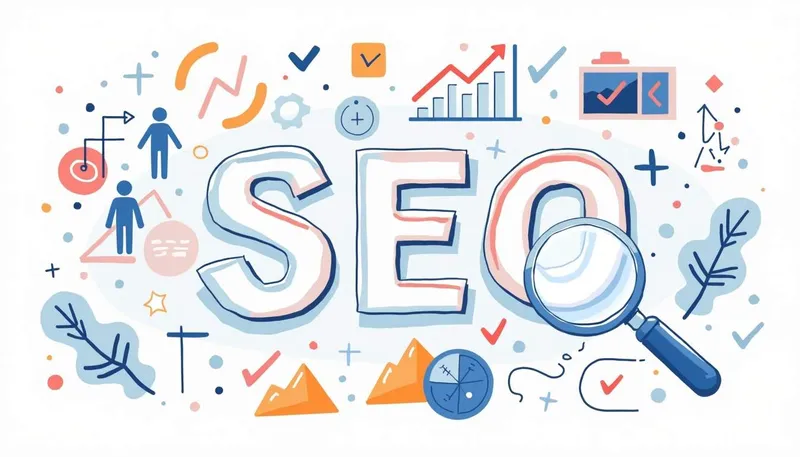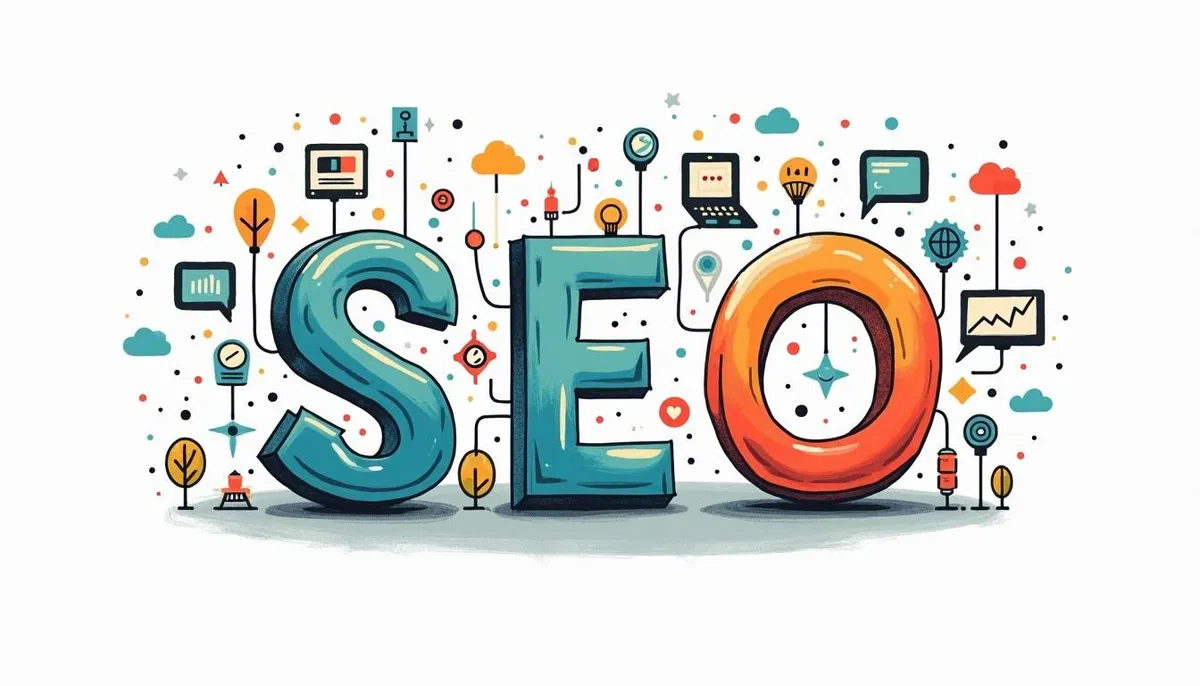Understanding SEO: What It Is and How It Works
Discover what SEO is and how it works to boost your website's visibility. Imagine you've just launched a website for your small business. You've poured your heart into the design, crafted compelling content, and even added some eye-catching images. Yet, when you type your business name into Google, your site is nowhere to be found on the first page. What gives? This is where SEO, or Search Engine Optimization, steps in. It's the key to making your website visible to the right people at the right time. But what exactly is SEO, and how does it work? Let's break it down.
What is SEO?
SEO stands for Search Engine Optimization. It's the practice of improving a website so that it ranks higher on search engine results pages (SERPs) like Google, Bing, or Yahoo. SEO helps ensure your site appears near the top when someone searches for something related to your business.
What Is SEO?
SEO stands for Search Engine Optimization. At its core, it's the practice of improving a website so that it ranks higher on search engine results pages (SERPs) like Google, Bing, or Yahoo. When someone searches for something related to your business, SEO helps ensure your site appears near the top of the list.
Think of search engines as librarians for the internet. They scan and catalog billions of web pages, then try to deliver the most relevant results when you ask a question. SEO is the art and science of making your website easier for these "librarians" to find, understand, and recommend.
Why SEO Matters
Most people don't scroll past the first page of search results. If your website isn't there, it's like having a store hidden down a dark alley. SEO drives organic (non-paid) traffic, which often converts better because users are actively searching for what you offer.
Besides visibility, SEO builds credibility. Websites that rank higher are usually seen as more trustworthy. Plus, good SEO practices improve user experience, making your site faster, easier to navigate, and more engaging.
Moreover, SEO is not a one-time task but an ongoing process that adapts to changes in search engine algorithms and user behavior. As search engines evolve, they place greater emphasis on factors like mobile-friendliness, page speed, and content quality. This means that businesses must stay informed about the latest trends and best practices to maintain their rankings. Implementing a robust SEO strategy can also give you insights into your audience's preferences and behaviors, allowing you to tailor your content and marketing efforts more effectively.
In addition to traditional SEO techniques, emerging trends such as voice search optimization and local SEO are becoming increasingly important. With the rise of smart speakers and mobile devices, more users are searching using voice commands, which often leads to different query structures than text-based searches. Local SEO, on the other hand, helps businesses attract customers in their geographical vicinity, making it essential for brick-and-mortar establishments. By optimizing for these trends, businesses can ensure they remain competitive in a rapidly changing digital landscape.
How Search Engines Work
Understanding SEO means first understanding how search engines operate. They perform three main tasks: crawling, indexing, and ranking.
Crawling: Discovering Content
Search engines use automated programs called "crawlers" or "spiders" to browse the internet. These bots follow links from one page to another, discovering new content along the way. If your site isn't linked anywhere or is blocked by certain settings, crawlers might never find it. Additionally, the frequency with which crawlers visit your site can depend on various factors, such as the site's update frequency and its overall authority. Websites that are frequently updated or have high traffic may be crawled more often, ensuring that the latest content is indexed promptly.
Indexing: Organizing Information
Once a crawler finds a page, the search engine tries to understand what it's about. It analyzes the text, images, videos, and other elements, then stores this information in a massive database called the index. This index is like a giant library catalog, ready to be searched whenever someone types a query. The indexing process also involves identifying keywords, understanding the context of the content, and assessing the overall quality of the page. This means that well-structured content with clear headings, relevant keywords, and proper metadata is more likely to be indexed effectively, making it easier for search engines to retrieve it later.
Ranking: Delivering Results
When you enter a search term, the engine sifts through its index to find the most relevant pages. It uses complex algorithms that consider hundreds of factors to decide which pages deserve to appear first. These factors include the quality of content, site speed, mobile-friendliness, backlinks, and more. Moreover, search engines are continually updating their algorithms to improve the accuracy of their results. This means that what worked for SEO a few years ago might not be effective today. For example, the rise of voice search has led to an increased emphasis on natural language processing, prompting webmasters to optimize their content for conversational queries. Understanding these nuances is crucial for anyone looking to enhance their visibility in search results.
Key Components of SEO
SEO isn't just one thing. It's a combination of strategies and tactics. Let's explore the main components that influence your website's search ranking.
On-Page SEO
On-page SEO focuses on optimizing individual pages to make them more search-engine friendly. This includes:
- Keywords: Using relevant words and phrases that people type into search engines.
- Title Tags and Meta Descriptions: These HTML elements tell search engines and users what your page is about.
- Content Quality: Providing valuable, original, and well-structured content that answers users' questions.
- URL Structure: Clean, descriptive URLs help both users and search engines understand the page's topic.
- Internal Linking: Linking to other pages on your site to help crawlers navigate and distribute authority.
Off-Page SEO
Off-page SEO involves actions taken outside of your website to improve its authority and reputation. The most important factor here is backlinks. Links from other websites pointing to yours.
Backlinks act like votes of confidence. If reputable sites link to your content, search engines interpret this as a sign that your site is trustworthy and valuable. However, not all backlinks are equal. Links from spammy or irrelevant sites can hurt your rankings.
Technical SEO
Technical SEO deals with the backend aspects of your website that affect crawling and indexing. This includes:
- Site Speed: Faster websites provide better user experiences and rank higher.
- Mobile-Friendliness: With more people browsing on phones, sites must be responsive.
- Secure Connections: HTTPS encryption is a ranking signal and builds user trust.
- XML Sitemaps: These files help search engines find and understand your site structure.
- Robots.txt: Controls which parts of your site crawlers can access.
How SEO Algorithms Determine Rankings
Search engines use complex algorithms that are constantly evolving. While the exact formulas are secret, SEO experts have identified key ranking factors that play a major role.
Relevance
Does your content match what the user is searching for? Search engines analyze keywords, synonyms, and context to determine relevance. This is why understanding your audience and their search intent is crucial.
Authority
Authority is a measure of how trustworthy and credible your site is. Backlinks from respected websites boost your authority. Social signals, brand mentions, and positive user reviews can also contribute.
User Experience
Search engines want to deliver results that users find helpful and easy to use. Factors like page load speed, mobile usability, clear navigation, and low bounce rates influence rankings.
Freshness
For some queries, newer content is more valuable. News articles, trends, and time-sensitive information benefit from frequent updates and fresh content.
Practical SEO Tips for Beginners
Getting started with SEO can feel overwhelming, but focusing on a few key practices can make a big difference.
Start with Keyword Research
Identify the terms your potential customers are searching for. Use tools like Google Keyword Planner or Ubersuggest to find keywords with good search volume and manageable competition. Then, naturally incorporate these keywords into your content.
Create Quality Content
Write for your audience, not just for search engines. Answer questions, solve problems, and provide valuable insights. Well-written, engaging content encourages visitors to stay longer and share your site.
Optimize Titles and Meta Descriptions
Craft clear, compelling titles that include your main keywords. Meta descriptions should summarize the page content and entice users to click. These elements show up in search results and influence click-through rates.
Improve Site Speed and Mobile Usability
Use tools like Google PageSpeed Insights to identify speed issues. Compress images, leverage browser caching, and minimize code where possible. Make sure your site looks and works well on smartphones and tablets.
Build Backlinks Naturally
Reach out to industry blogs, participate in forums, and create shareable content like infographics or guides. Avoid buying links or using shady tactics. These can backfire.
Measuring SEO Success
SEO is a long-term game. Results don't appear overnight, but tracking progress helps you stay on course.
Use Analytics Tools
Google Analytics and Google Search Console provide valuable data on traffic, user behavior, and keyword performance. Monitor which pages attract visitors, how long they stay, and where they come from.
Track Keyword Rankings
Regularly check how your site ranks for target keywords. Improvements here often correlate with increased traffic and conversions.
Monitor Backlinks
Keep an eye on your backlink profile to ensure links are high quality and relevant. Tools like Ahrefs or Moz can help with this.
Common SEO Mistakes to Avoid
Even experienced marketers slip up sometimes. Here are pitfalls to watch out for:
Keyword Stuffing
Overloading your content with keywords makes it unreadable and can lead to penalties. Focus on natural language and user experience.
Ignoring Mobile Users
With the majority of searches happening on mobile devices, a non-responsive site loses visitors and rankings.
Neglecting Technical SEO
Broken links, slow loading times, and poor site structure confuse search engines and frustrate users.
Buying Low-Quality Backlinks
Spammy links can harm your site's reputation and result in search engine penalties.
The Future of SEO
Search engines are getting smarter, incorporating artificial intelligence and machine learning to better understand user intent. Voice search, visual search, and personalized results are becoming more common.
SEO will continue to evolve, but the fundamentals remain the same: create valuable content, build trust, and provide a great user experience.

Mastering SEO takes time and effort, but it's one of the most effective ways to grow your online presence and connect with your audience. Start with the basics, stay consistent, and watch your website climb the search rankings.
Frequently Asked Questions
What is SEO?
SEO stands for Search Engine Optimization. It's the practice of improving a website so that it ranks higher on search engine results pages (SERPs) like Google, Bing, or Yahoo. SEO helps ensure your site appears near the top when someone searches for something related to your business.
How does SEO work?
SEO works by optimizing your website for search engines through three main processes: crawling (discovering content), indexing (organizing information), and ranking (delivering results). Search engines use algorithms that consider factors like content quality, site speed, mobile-friendliness, backlinks, and user experience to determine rankings.
Why is SEO important?
SEO is important because most people don't scroll past the first page of search results. It drives organic (non-paid) traffic, builds credibility, improves user experience, and helps your website reach the right audience at the right time. Good SEO practices make your site faster, easier to navigate, and more engaging.
What are the main components of SEO?
The main components of SEO are: On-page SEO (optimizing individual pages with keywords, titles, content quality, URLs, and internal linking), Off-page SEO (building authority through backlinks from other websites), and Technical SEO (ensuring site speed, mobile-friendliness, security, and proper site structure).
How long does it take to see SEO results?
SEO is a long-term strategy. Results typically don't appear overnight. It can take several months to see significant improvements in rankings and traffic. Consistency, quality content, and following SEO best practices are key to achieving sustainable results over time.
Step-by-Step Guide
- 1
Understand what SEO is
SEO stands for Search Engine Optimization. It's the practice of improving a website to rank higher on search engine results pages. Think of search engines as librarians for the internet who scan and catalog web pages.

- 2
Learn how search engines work
Search engines perform three main tasks: crawling (discovering content with bots), indexing (organizing information in a database), and ranking (delivering results based on algorithms that consider hundreds of factors).

- 3
Focus on key SEO components
Work on on-page SEO (keywords, titles, content quality, URLs, internal linking), off-page SEO (building backlinks from reputable sites), and technical SEO (site speed, mobile-friendliness, security, sitemaps).

- 4
Start with keyword research
Identify terms your potential customers are searching for using tools like Google Keyword Planner or Ubersuggest. Find keywords with good search volume and manageable competition, then naturally incorporate them into your content.

- 5
Create quality content
Write for your audience, not just search engines. Answer questions, solve problems, and provide valuable insights. Optimize titles and meta descriptions, improve site speed and mobile usability, and build backlinks naturally.

- 6
Measure and track progress
Use Google Analytics and Search Console to monitor traffic, user behavior, and keyword performance. Track keyword rankings and monitor your backlink profile. SEO is a long-term game, so be patient and consistent.


Web developer specializing in Astro and modern frontend technologies. Passionate about creating educational content.



